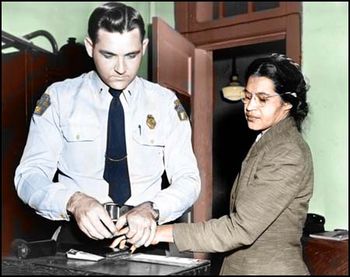This article is posted in honor of Black History Month:
From Biography.com:
 The Montgomery, Alabama city code required that all public transportation be segregated and that bus drivers had the “powers of a police officer of the city while in actual charge of any bus for the purposes of carrying out the provisions” of the code. While operating a bus, drivers were required to provide separate but equal accommodations for white and black passengers by assigning seats. This was accomplished with a line roughly in the middle of the bus separating white passengers in the front of the bus and African-American passengers in the back. When an African-American passenger boarded the bus, they had to get on at the front to pay their fare and then get off and re-board the bus at the back door. When the seats in the front of the bus filled up and more white passengers got on, the bus driver would move back the sign separating black and white passengers and, if necessary, ask black passengers give up their seat.
The Montgomery, Alabama city code required that all public transportation be segregated and that bus drivers had the “powers of a police officer of the city while in actual charge of any bus for the purposes of carrying out the provisions” of the code. While operating a bus, drivers were required to provide separate but equal accommodations for white and black passengers by assigning seats. This was accomplished with a line roughly in the middle of the bus separating white passengers in the front of the bus and African-American passengers in the back. When an African-American passenger boarded the bus, they had to get on at the front to pay their fare and then get off and re-board the bus at the back door. When the seats in the front of the bus filled up and more white passengers got on, the bus driver would move back the sign separating black and white passengers and, if necessary, ask black passengers give up their seat.
On December 1, 1955, after a long day at work at the Montgomery Fair department store, Rosa Parks boarded the Cleveland Avenue bus for home. She took a seat in the first of several rows designated for “colored” passengers. Though the city's bus ordinance did give drivers the authority to assign seats, it didn't specifically give them the authority to demand a passenger to give up a seat to anyone (regardless of color). However, Montgomery bus drivers had adopted the custom of requiring black passengers to give up their seats to white passengers, when no other seats were available. If the black passenger protested, the bus driver had the authority to refuse service and could call the police to have them removed. As the bus Rosa was riding continued on its route, it began to fill with white passengers. Eventually, the bus was full and the driver noticed that several white passengers were standing in the aisle. He stopped the bus and moved the sign separating the two sections back one row and asked four black passengers to give up their seats. Three complied, but Rosa refused and remained seated. The driver demanded, “Why don't you stand up?” to which Rosa replied, “I don't think I should have to stand up.” The driver called the police and had her arrested. Later, she recalled that her refusal wasn't because she was physically tired, but that she was tired of giving in. The police arrested Rosa at the scene and charged her with violation of Chapter 6, section 11 of the Montgomery City code. She was taken to police headquarters where later that night she was released on bail. On December 8, Rosa faced trial and in a 30 minute hearing was found guilty of violating a local ordinance. She was fined $10, plus a $4 court fee.
More here.
